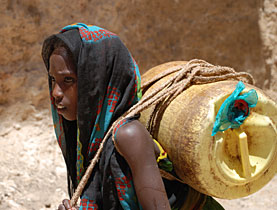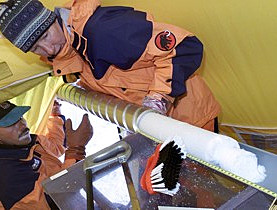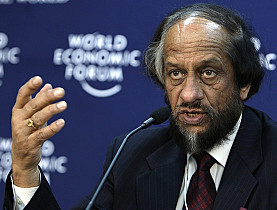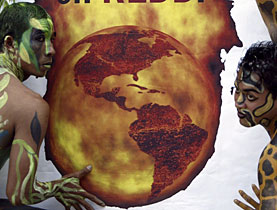Charities demand “climate justice”

The charities of the Swiss Catholic and Protestant churches are calling on developed nations to cover the cost of climate change in developing countries.
Lenten Fund and Bread for All say that it would be unfair for the North to expect the South to put its development on hold in the name of mitigating the effects of global warming.
Speaking at an international symposium organised by the two charities in the Swiss capital Bern, the head of Lenten Fund Antonio Hautle said people in the developing world were particularly affected by climate change.
“Because of human-influenced global warming, sea levels are [for example] rising, water is becoming scarce and hurricanes are destroying crops in these areas,” he pointed out.
For Hautle, this is made worse by the fact that the developed world, while using the most resources and being the main generator of climate change, does not shoulder its share of the burden.
“Dealing with the results of climate change is not a local problem, but a global one,” he added.
Future could be worse
According to the United Nations Intergovernmental Panel on Climate Change (IPCC), global warming is here to stay, affecting areas such as food production, especially in developing countries, and leading to higher prices that hurt the poor most.
The situation could even get far worse than predicted by the IPCC, said one of its contributing scientists, Andreas Fischlin.
“Polar ice is for example melting much faster than we expected, and greenhouse gas emissions are growing faster too,” he explained.
Developing nations seem to be particularly badly hit by climate change.
According to Alexandre Kettly, of Haiti’s Papaye farmers’ movement, her country – one of the planet’s poorest – has seen 40 per cent more natural disasters since the 1960s, with devastating consequences, both for the environment and for the population.
“Climate change increases the gap between rich and poor,” she added. “It also takes away any chance these people had of improving their conditions and creates serious problems for future generations.”
Taking responsibility
For the charities, the consequences of global warming and how to mitigate its effects are now an issue of what they call “climate justice” and solidarity, a position backed by Johannes Müller, a Jesuit priest and professor of social science and development policy in Munich.
“Rich countries have a moral obligation to recognise that their debt stretches far beyond their borders, that they have a responsibility,” he said.
“They must pursue environmentally friendly development, and help developing nations financially and technically to reach the same goal.”
For countries and their populations struggling to make ends meet, this is a crucial point.
Kettly says that nations such as Haiti can ill afford to invest what little money they have in fighting climate change when they are struggling to feed their people. Ignoring the threat would be tantamount to a violation of human rights, which is why rich countries have a vital role to play she added.
However, the question remains what form any help from developed nations should take and how much should be given.
One solution could be the use of Greenhouse Development Rights. By setting a so-called “development threshold”, it defines national obligations in dealing with climate change.
For countries below the threshold this means being able to focus on development, according to Nelson Muffuh of British charity Christian Aid. Those above it would pay for “the global costs of an emergency climate programme.”
“You could compare it to a zero-tax bracket,” he explained.
But Swiss Environment Minister Moritz Leuenberger warned that finding solutions wasn’t just in the hands of governments.
“Individual behaviour has global consequences, but we refuse to acknowledge our responsibility,” he said. “That’s because we don’t feel the effects personally.”
The charities have already made a few suggestions on how to slow down climate change. They have asked Switzerland’s parishes to check their greenhouse gas emissions and called on consumers to buy local produce.
swissinfo, Scott Capper
In a report issued last year, IPCC scientists said it was “very likely” – or more than 90 per cent probable – that global warming was man-made.
The report predicted a “best estimate” that temperatures would rise by between 1.8-4°C in the 21st century, within a likely range from 1.1-6.4°C.
The study projected a rise in sea levels of between 28-43cm in the 21st century.
Another IPCC report said that a warming world would place hundreds of millions of extra people at greater risk of food and water shortages and threaten the survival of thousands of species of plants and animals.
Floods, heat waves, famines, storms and droughts are all expected to increase, with people in poorer countries suffering the worst effects.

In compliance with the JTI standards
More: SWI swissinfo.ch certified by the Journalism Trust Initiative



You can find an overview of ongoing debates with our journalists here. Please join us!
If you want to start a conversation about a topic raised in this article or want to report factual errors, email us at english@swissinfo.ch.